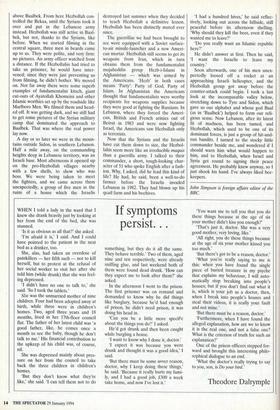If symptoms
persist.. .
WHEN I told a lady in the ward that I knew she drank heavily just by looking at her from the end of the bed, she was stunned.
'Is it as obvious as all that?' she asked.
`I'm afraid it is,' I said. And I could have pointed to the patient in the next bed as a drinker, too.
She, alas, had taken an overdose of painkillers — her fifth such — not to kill herself, but to protest at the refusal of her social worker to visit her after she told him (while drunk) that she was feel- ing depressed.
`I didn't have no one to talk to,' she said. `So I took the tablets.'
She was the unmarried mother of nine children. Four had been adopted away at birth, while three were in children's homes. Two, aged three years and 18 months, lived in her 17th-floor council flat. The father of her latest child was 'a good father, like, he comes once a month to see the baby, though he don't talk to me.' His financial contribution to the upkeep of his child was, of course, nil.
She was depressed mainly about pres- sure on her from the council to take back the three children in children's homes.
`But they don't know what they're like,' she said. 'I can tell them not to do something, but they do it all the same. They behave terrible.' Two of them, aged nine and ten respectively, were already sniffing glue, and last weekend both of them were found dead drunk. 'How can they expect me to look after them?' she asked.
In the afternoon I went to the prison. The first prisoner was on remand and demanded to know why he did things like burglary, because he'd had enough of prison, he didn't need prison, it was doing his head in.
`Can you be a little more specific about the things you do?' I asked.
He'd got drunk and then been caught while burgling a house.
'I want to know why I done it, doctor.'
`I expect it was because you were drunk and thought it was a good idea,' I said.
`But there must be some uwer reason, doctor, why I keep doing these things,' he said. 'Because it really hurts my fami- ly, and I had a good job, £300 a week take home, and now I've lost it.' `You want me to tell you that you do these things because at the age of six your mother didn't kiss you enough?'
`That's just it, doctor. She was a very good mother, very loving, like.'
`All right, you do these things because at the age of six your mother kissed you too much.'
`But there's got to be a reason, doctor.'
`What you're really saying to me is this: when you have found the single piece of buried, treasure in my psyche that explains my behaviour, I will auto- matically stop breaking into people's houses; but if you don't find out what it is, which is your job as a doctor, then, when I break into people's houses and steal their videos, it is really your fault and not mine.'
`But there must be a reason, doctor.'
`Furthermore, when I have found the alleged explanation, how are we to know it is the real one, and not a false one? What is the criterion of truth for such an explanation?'
One of the prison officers stepped for- ward and brought this interesting philo- sophical dialogue to an end.
`What the doctor's really trying to say to you, son, is Do your bird.'
Theodore Dalrymple


































































 Previous page
Previous page